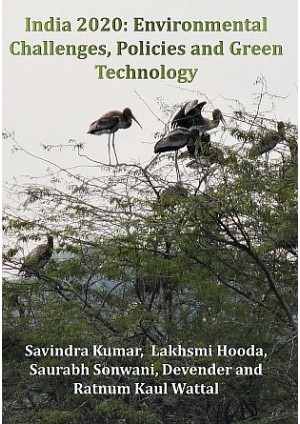India 2020 : Environmental Challenges, Policies and Green Technology
ISBN :978-81-932621-1-5
Author Name :Savindra Kumar, Lakshmi Hooda, Saurabh Sonwani, Devender and Ratnum Kaul Wattal
Published By :Imperial Publications
Language :English
Edition :2020
No of pages :148
Preface
Water is a natural resource which is depleting at an alarming rate across the globe. Rapid population growth, unsustainable industrial activities together with immense human interference with the natural resources, has led to present water-crisis. There is confrontation among nations, states and societies due to the gap between demand and supply. Water pollution and poor water management strategies have brought us to the brink of water shortage. Access to clean water and adequate sanitation is at present, a global problem. According to UNICEF and the World Health Organization, report in 2019 around 2.2 billion people around the world lack safely managed drinking water services and 4.2 billion people do not have safely managed sanitation services. Intensive water use in agriculture, non-eco-friendly manufacturing process and poor land use practices across the globe are withdrawing or contaminating groundwater at an alarming rate. Concurrent with the ecological dimensions of the water crisis there are issues related with public health, since a lot many diseases are water-borne, particularly in the developing world. Existing systems need to be modified, or new systems need to be created, so as to achieve wider access to clean drinking water, as well as to provide for effective redressal of public health concerns. The questions that confront the world today are to ensure adequate supply of clean water not only for present generation but also need to leave enough for future generations. How can equitable access be ensured and by whom? What will be the effect of climate change on the quantity and quality of water? Could the water crises be a likely cause of third world war? How is this problem to be addressed? The agenda for sustainable development was adopted globally in 2015 with the aim to end poverty and it has also included a dedicated goal on water and sanitation. The need of the hour is to introduce and implement water resource management at all levels. Water governance requires an ethical approach. Water management policies will have a profound effect on biodiversity loss as well as socio-cultural changes such as, forced migration and resettlement.
There is marvellous work going around globally attempting to address the problem of water scarcity, pollution, alternate green technologies to combat water pollution and strategies to protect water cycle in a manner that degradation of environment is taken care of. It was this fact which made us realize the need for a review of existing challenges and their redressal mechanisms in terms of green technologies, policies, governance and ethics. The available literature has been reviewed to provide in-depth knowledge about the water crisis that is looming large.
Keeping these challenges in mind, the book comprises of 14 chapters in a logical sequence and mentions significant components of the environmental challenges, policies and green technologies. The book begins with a brief account of the environmental issues of the present times and water sustainability being one of the major crises. It also discusses the ethical issues in addressing the environmental challenges. The need of the hour is to come up with technological as well as valuebased interventions to mitigate environmental challenges in order to ensure a safe future for the generations to come. The main cruces of the book revolve around the water cycle, impact and remediation of contaminants /chemicals generated through various anthropogenic activities which lead to degradation of the environment, especially the hydrosphere. The sustainable development goals (SDG) adopted in 2015 were taken into consideration during drafting this book. The water crisis, challenges and implications are also mentioned in detail with possible and sustainable solutions. The book provides in depth information about restoration of degraded wetlands, phytoremediation, sustainable agriculture based on use of plant growth promoting rhizobacteria, acid rains and their environmental impact. Attention has also been drawn to the new technologies of biochar and use of seaweed liquid extracts to achieve environmental sustainability.
On the whole the book tries to cover all aspects of water crisis, mitigation strategies and ethical issues related with this natural resource. In our opinion, the book will be of great help to students of environmental sciences, scientists, and researchers as well as to non-government organizations trying to address the problems of water scarcity, pollution, creating awareness about nsustainable clean water, wetland revival and several other water related issues.
- Rs.950.00
-
Rs.850.00

